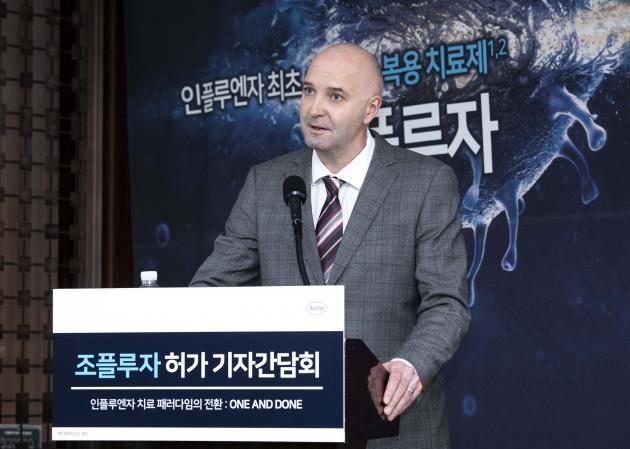Roche Korea’s Xofluza is a new influenza treatment, a first-in-class, single-dose oral medicine with a novel mechanism of action designed to target influenza A and B viruses, the company said Tuesday.
The antiviral, which arrived in Korea for the first time in 20 years, is an antiviral with a new mechanism that inhibits polymerase acidic endonuclease, an enzyme essential for viral replication and prevents progression from the initial stage of virus replication and prevents virus propagation, it added.

The unmet medical demand for influenza is still high, and Xofluza can quickly relieve flu symptoms and shorten the time needed to detect the flu virus, which will prevent the transmission of the virus," said Professor Jacob Lee of Hallym University Kangnam Sacred Heart Hospital, in a news conference at Westin Chosun Seoul Tuesday.
Xofluza had excellent antiviral activity and stopped virus replication and detection significantly faster than placebo or oseltamivir and is also safe and effective in treating influenza symptoms in healthy and high-risk patients, he added.
Professor Lee stressed that he expects that the drug will also have a positive effect on influenza management in the long term.
The company won the local approval for the drug on Nov. 22.
The Ministry of Food and Drug Safety gave the nod based on the results of a CAPSTONE-1 clinical study in patients aged between 12 and 64 with acute influenza who did not have complications, and the CAPSTONE-2 clinical study in high-risk flu patients 12 years of age and older. The CAPSTONE-1 clinical study compared Xofluza with placebo or oseltamivir in 1,064 patients. The primary endpoint was time taken to alleviate the symptoms of the patients.
The results showed that the median time to symptomatic relief was 53.7 hours in the Xofluza-treated group, versus 80.2 hours in the placebo-administered group. The Xofluza group was 26.5 hours quicker in the alleviation of symptoms than the placebo group.
During the news conference, the company also expressed its intent to expand the indication for the antiviral for patients under the age of 12.
"The U.S. FDA is expected to approve Xofluza for treating children next year," said Choi In-hwa, Roche Korea’s market access and public affairs director. "In Korea, we plan to receive approval following the U.S. approval." However, the company is not sure when this approval will be granted, she added.
Roche also addressed the concerns that Xofluza may cause a mutation of the virus, which, in turn, can lead to drug resistance, especially in children.

"In the case of antiviral agents, the resistance to antivirals continues to arise because the virus continually mutates," said Aeron Hurt, Roche's principal global medical director for influenza.
Hurt stressed that the resistance could be divided into two classes. "First, even if resistance occurs, influenza itself is an acute infection, so there are some mutations that the immune response in our body naturally eliminates," Hurt said. "Then there are cases where mutated viruses that evade the patient's immune system survive and propagate." However, there have been no such reported cases for Xofluza, he added.
Commenting on mutating concerns in children, Hurt said, "It is generally known that all influenza antivirals can have more resistant mutations occur in children. This is because the duration and amount of virus detection in children are longer and more abundant."
However, the company's clinical data show that even if the virus is resistant, the clinical benefit is greater, he added.

